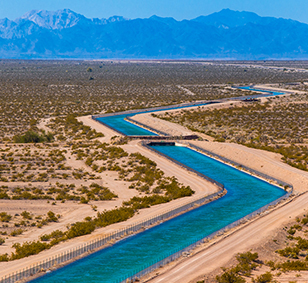An early lesson I learned as a young staffer for the late Senator Bill Armstrong was the importance of careful consideration. He disliked being rushed into hasty decisions and developed a standard response to any demand for immediate action. “If you need an answer right now,” he would say, “the answer is no.” If there was time for more thought, homework, reading, and studying all the implications, the answer could be different. He understood that rushed judgments are rarely good judgments.
Colorado River negotiators ought to keep that in mind as they are being prodded to make new interstate agreements that could supplant a century of western water law.
CNN reported a few days ago that the Administration is “trying to throw a Hail Mary to save the Colorado River” before President Biden leaves office in two months. His appointees would love to be able to boast of finally solving the problem of administering the river during times of drought. One can certainly understand that objective; everyone wants bragging rights. But that is their agenda, not Colorado’s.
The Biden administration demanded, as it has for four years, that all seven Colorado River Basin states agree to divide the river’s water differently than the existing interstate compact requires, to “protect” the river into the future. They forget that the ultimate “protection” for Colorado and the other Upper Basin states (Utah, Wyoming, and New Mexico) is rigid enforcement of the existing interstate compact, which has governed distribution since 1922.
It is perennial truth, during times of drought and surplus, that the Lower Basin states of Nevada, Arizona, and especially California, continuously argue for rewriting that historic agreement to give themselves more water from the Upper Basin. And since Colorado is the one remaining state that has never developed its entire entitled share, that inevitably means they want more of Colorado’s water.
Colorado has always said, under the leadership of twenty Governors of both parties, that it will not reopen negotiations on the compact, and will not yield any of its entitled water to other states. Still, for over a decade the Bureau of Reclamation has made varying demands for all seven states to agree to drought plans, flow requirements, and other management agreements, all with the intent of reducing the use of water that Colorado owns. As I have written in nearly a dozen columns on this issue over the years, the Bureau of Reclamation has absolutely zero legal authority to make such demands of the Upper Basin. Colorado should tell the current Administration, and future appointees of any other, that it has no intention of reducing its entitled share and will defend its interests in court if necessary. I believe that is precisely what Colorado will do now.
Even the CNN story acknowledged, quoting multiple sources involved in the negotiations, “getting all states and stakeholders to agree in just two months how much water they could be entitled to for decades is extremely doubtful, if not impossible.”
Just a few days earlier, Fresh Water news reported that negotiators from the seven states were, in fact, preparing for new leadership from a new Administration, at least one of them promising that the transition would not “derail the process.”
That “process” is intended to replace water management rules that were agreed upon by the seven states in 2007 and will expire in 2026. Because of that timeline, the Bureau insists that all the states agree – now – on rules for managing the federal dams and reservoirs before then. The reason the Bureau considers it so urgent is that it requires time to promulgate new federal regulations, under the National Environmental Policy Act (NEPA), including environmental studies, public comment and waiting periods, revisions, appeals, and perhaps litigation – all following procedures required by the White House Council on Environmental Quality (CEQ).
That last detail matters a great deal now, because the D.C. Circuit Court of Appeals (often called the nation’s second-highest court) just ruled that CEQ has no such regulatory power, creating uncertainty about all agency actions taken in compliance with CEQ.
It is one of the key sticking points between states, because the Upper Basin has already said it may be willing to negotiate, but not under the strict NEPA procedure the Bureau insists upon. So slow down. Any demands for these states to make decisions right now, before one President leaves and another arrives, should be met with the skepticism eleventh-hour government always deserves. If they need an answer right now, the answer is no.





Greg, Kurt Christensen forwarded this to me. Great piece.. I’m glad you’re still out there leading us through the battles.🙂Will you please put me on your regular mailing list?
Cheers,
Dennis
Done, thanks. Great to hear from you, hope you’re well.
GW
Comments on this entry are closed.
{ 1 trackback }